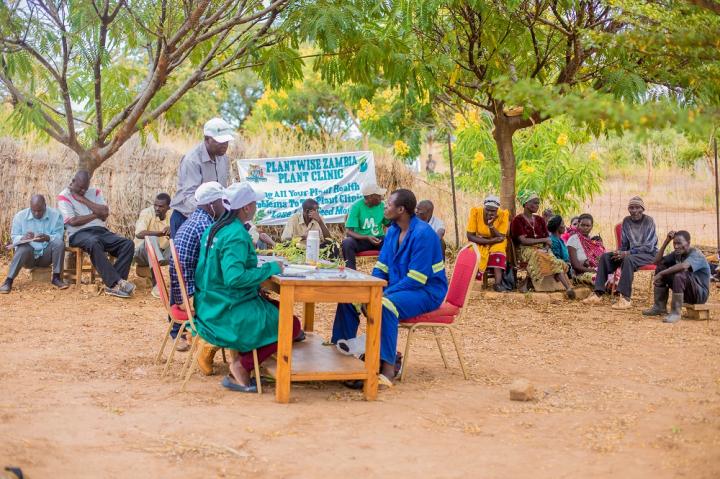CABI-led Plantwise plant clinics can help promote more sustainable ways to fight crop pests and diseases in Rwanda and Zambia – such as the fall armyworm – with the judicial use of pesticides within Integrated Pest Management (IPM) plans.

Credit: CABI
CABI-led Plantwise plant clinics can help promote more sustainable ways to fight crop pests and diseases in Rwanda and Zambia – such as the fall armyworm – with the judicial use of pesticides within Integrated Pest Management (IPM) plans.
Dr Justice Tambo, lead author of the study published in the journal Food Policy, surveyed 1,474 farm households in Rwanda and Zambia and found that although farmers who visit plant clinics show a higher probability of opting for pesticides for pest control, they do not use them intensively and are more likely to adopt safer and more sustainable alternatives.
The scientists, which include researchers from the Rwanda Agriculture and Animal Resources Development Board (RAB) and the Zambia Agriculture Research Institute (ZARI), also revealed that plant clinic users are significantly more likely than non-users to wear protective clothing while working with pesticides.
Crop pests are a major limiting factor of agricultural productivity growth worldwide and in Sub-Saharan Africa, in particular, crop losses due to pests are predicted to be between 40% to 60%. The fall armyworm, for example, was confirmed on the continent in 2016 and has the potential to cause annual maize losses of about 8 to 20 million tonnes in just 12 countries.
Dr Tambo said, “In this study, we investigated whether plant clinics can enhance rational use of pesticides, in terms of reduced use of highly toxic or banned pesticides, adoption of alternative and environmentally friendly pest management practices, proper disposal of pesticide wastes, use of personal protective equipment (PPE), and the implications for incidence of pesticide-related ill-health.
“The IPM paradigm aims to reduce reliance on pesticides by encouraging the use of a combination of sustainable pest control practices. IPM techniques include judicious use of pesticides, as well as non-chemical pest management practices, such as intensive monitoring, resistant varieties, cultural control, physical or mechanical control and biological control.”
Plant clinics, which are set up at public places such as markets and village centres, allow any farmer to bring a sample of any ‘sick’ crop where a plant doctor will be able to identify, diagnose and recommend treatment for the farmer to consider.
In collaboration with national partners, the Plantwise programme has established about 4,500 plant clinics in 34 countries across Africa, Asia and Latin America. In Rwanda, there are 66 active plant clinics that are manned by 230 trained plant doctors. Similarly, Zambia has 121 plant clinics that are staffed by 352 plant doctors.
At the time of this study, these plant clinics had attended to 16,130 and 12,000 farmers’ queries on about 100 crops in Rwanda and Zambia respectively, signifying their growing popularity and importance as a source of plant health information.
Mr Mathews Matimelo, of ZARI, said, “Pesticides can provide rapid means of controlling pests and prevent crop losses, but they can also pose a major risk to humans, animals and the environment, if not used judiciously.
“Plant clinic users are more likely than non-users to use pesticides in combination with other non-chemical methods of pest control, including cultural and physical methods such as crop rotation and handpicking of egg masses and larvae.
“In particular, our impact estimates indicated that clinic users adopt significantly more FAW management options than their matched non-clinic user counterparts – 15% and 20% more in Zambia and Rwanda, respectively.”
The researchers conclude that the plant clinic extension approach would benefit from scaling so as to promote IPM adoption in smallholder agriculture.
In addition, they suggest that further training could be given to the small percentage of farmers to help them steer clear of banned, restricted or wrong pesticides as well as the proper use of PPE.
###
Full paper reference
Justice A. Tambo, Dannie Romney, Idah Mugambi, Fredrick Mbugua, Mary Bundi, Bellancile Uzayisenga, Mathews Matimelo and Mathias Ndhlovu, ‘Can Plant Clinics Enhance Judicious Use of Pesticides? Evidence from Rwanda and Zambia,’ 22 March 2021, Food Policy, DOI: 10.1016/j.foodpol.2021.102073
The paper can be viewed open access here:
https:/
Media Contact
Wayne Coles
[email protected]
Original Source
https:/
Related Journal Article
http://dx.




